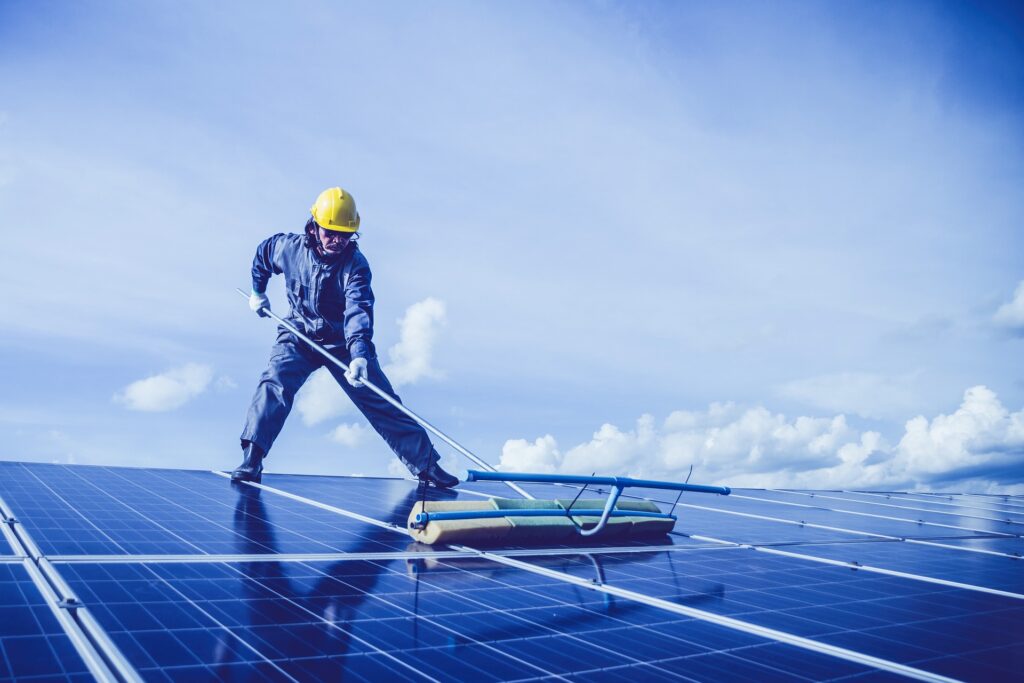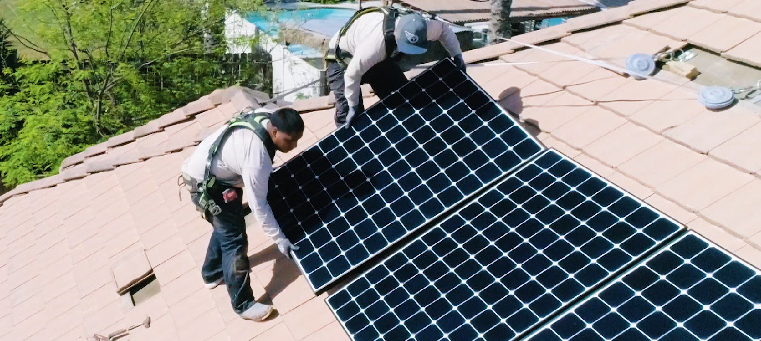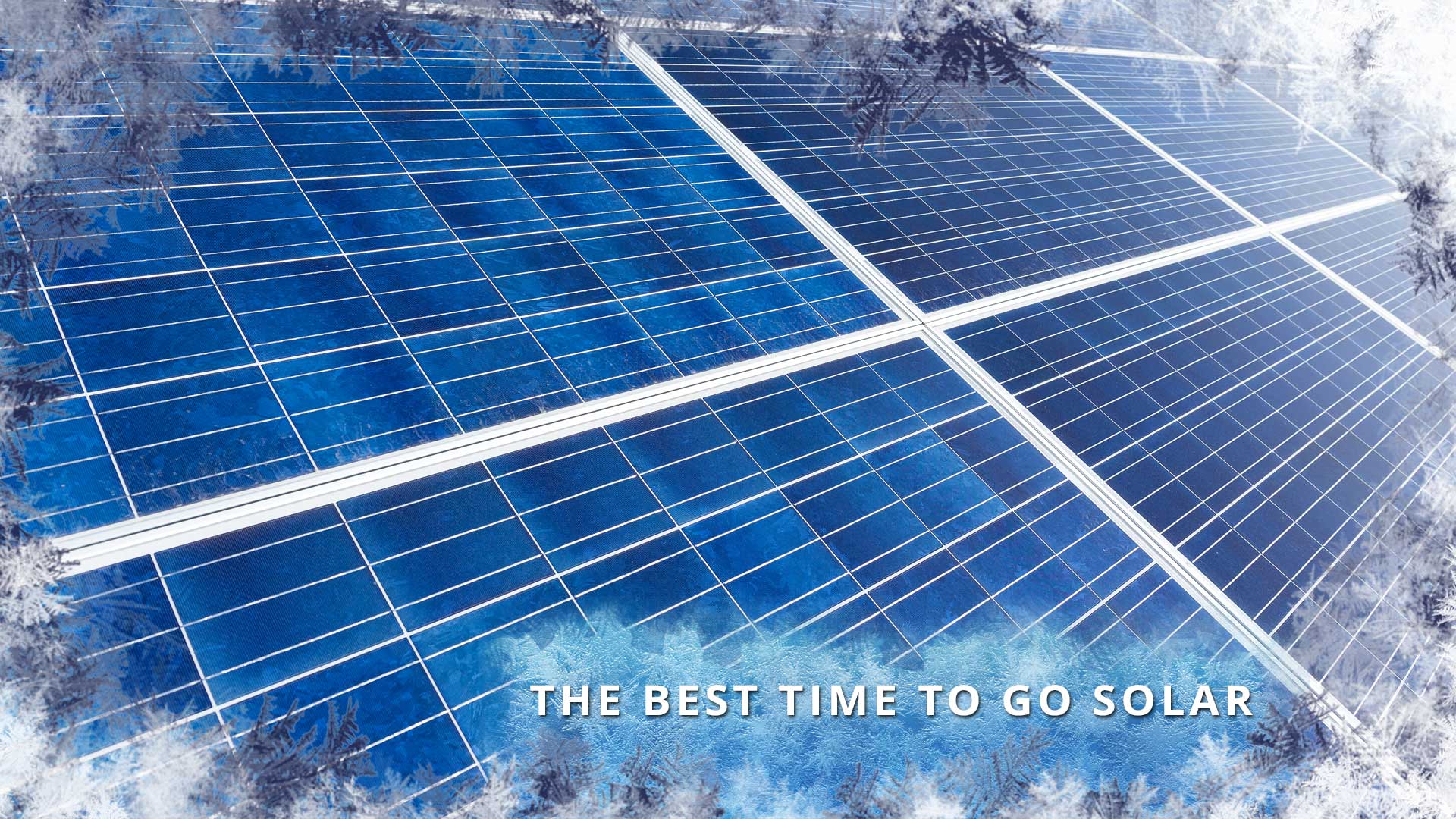The best Time to Get Solar Panels is now, as the cost of solar installation has significantly decreased, there are various financial incentives available, and solar energy can help reduce your electricity bills while also benefiting the environment. Solar panels have become more affordable in recent years, making it a wise investment for homeowners.
Deciding on the best time to get solar panels involves considering several factors, including financial incentives, energy needs, weather conditions, and technological advancements. Here are some key points to help determine the optimal timing for installing solar panels:
1. Financial Incentives and Rebates
Availability of Incentives:
- Federal Incentives: In many countries, federal incentives like tax credits can significantly reduce the cost of solar installations. For example, in the U.S., the Federal Investment Tax Credit (ITC) allows you to deduct a significant percentage of the installation cost from your federal taxes.
- State and Local Incentives: Additional state or local incentives can provide rebates, grants, or tax breaks that further reduce the cost.
- Utility Rebates: Some utility companies offer rebates for installing solar panels.
Optimal Timing:
- Research and take advantage of these incentives while they are available. Many incentives have expiration dates or reduce in value over time.
2. Energy Needs and Usage Patterns
High Energy Usage Periods:
- If you experience high electricity bills during certain seasons (e.g., summer due to air conditioning), installing solar panels before these high-usage periods can help you start saving immediately.
Home Improvements:
- Consider timing your solar installation with other home improvements, especially if you’re replacing the roof or upgrading your electrical system.
3. Weather and Seasonality
Installation Conditions:
- Spring and Fall: These seasons often offer mild weather, which can be ideal for installation. Installers are typically less busy than in the summer, leading to faster scheduling and potentially lower costs.
- Winter: In cold climates, winter can pose challenges such as snow and shorter daylight hours, which may delay the installation process.
Solar Production:
- Summer: Solar panels generate the most electricity during the summer due to longer days and more direct sunlight. Installing panels before summer allows you to maximize energy production during peak months.
4. Technological Advancements
New Technologies:
- The solar industry is continuously evolving with improvements in panel efficiency, energy storage solutions, and smart home integrations. Staying updated on these advancements can help you decide if it’s worth waiting for a new technology or if current models meet your needs.
5. Market Conditions
Solar Industry Trends:
- Costs: Solar panel prices have been decreasing over the years due to advancements in technology and increased competition. Monitoring market trends can help you decide the best time to purchase.
- Demand: High demand can sometimes lead to longer wait times for installation. Off-peak times might offer better deals and quicker installations.
6. Long-Term Planning
Investment Horizon:
- Solar panels are a long-term investment. The sooner you install them, the sooner you start saving on energy bills and reducing your carbon footprint. Delaying installation means delaying these benefits.
Best Time to Get Solar Panels:
- Financially: When federal, state, and local incentives are most favorable.
- Seasonally: Spring or fall for ideal installation conditions.
- Technologically: When you find a balance between current technology and waiting for any anticipated advancements.
- Usage: Before high electricity usage periods to maximize immediate savings.
Additionally, there are federal tax credits and state incentives that can further offset the initial costs. By installing solar panels, you can generate your own clean energy, reduce your reliance on fossil fuels, and contribute to the fight against climate change.
Furthermore, solar panels have a long lifespan and require minimal maintenance, ensuring a reliable and sustainable energy source for years to come.

Benefits Of Solar Panels
Discover the best time to invest in solar panels and reap the benefits of clean, renewable energy. Don’t miss out on the opportunity to reduce your utility bills and make a positive impact on the environment.
Lower Electricity Bills
Solar panels can dramatically lower your electricity bills as they generate their own power from the sun’s rays, reducing your reliance on traditional electricity sources.
Reduced Dependence On The Grid
With solar panels, you’ll enjoy increased energy independence, relying less on the grid for your power needs. This can provide a sense of security, especially during power outages or emergencies.
Environmental Benefits
Solar panels offer positive environmental impact, as they produce clean and renewable energy without emitting harmful greenhouse gases. By using solar power, you can contribute to reducing carbon emissions and combating climate change.

Credit: www.sempersolaris.com
Factors To Consider
When deciding to invest in solar panels, there are several crucial factors to consider that can greatly impact the effectiveness and profitability of your solar energy system. By taking into account these key considerations, you can make an informed decision about the best time to install solar panels. Let’s explore these factors in more detail:
Location And Climate
Your location and climate play a significant role in determining the ideal time to get solar panels. The amount of sunlight your area receives affects the efficiency and potential output of your solar panels. Regions with long hours of sunshine, such as deserts or coastal areas, are generally better suited for solar panel installations. Additionally, areas with less shade and fewer obstructions, such as tall buildings or trees, allow for optimum sunlight exposure throughout the day.
| Location and Climate Factors to Consider |
|---|
| • Average annual sunlight hours |
| • Prevailing weather patterns and cloud cover |
| • Potential for shade from nearby buildings or trees |
Energy Consumption
Understanding your energy consumption is vital when determining the best time to invest in solar panels. Evaluate your electricity bills to get an accurate idea of your monthly energy usage. If you have historically high energy consumption, installing solar panels can significantly reduce your electricity bills and provide long-term savings. Additionally, it’s essential to consider your future energy needs. If you anticipate an increase in energy consumption, it might be advantageous to install solar panels sooner rather than later.
- Considerations for Energy Consumption
- • Analyze your electricity bills for average monthly consumption.
- • Assess any future changes in your energy needs.
Cost And Financing Options
Cost is undoubtedly a critical factor when deciding on the optimal time to invest in solar panels. While solar panel costs have significantly decreased in recent years, it’s crucial to assess the overall affordability of the system for your specific situation. Research financing options like loans, leases, or power purchase agreements (PPAs) that might help you overcome the upfront costs associated with solar panel installations. Additionally, consider the potential tax incentives or rebates available in your area, which can further reduce the overall cost.
- Key Cost and Financing Considerations
- • Evaluate overall affordability of solar panels.
- • Research financing options, tax incentives, and rebates.
Peak Sunlight Hours
Discover the peak sunlight hours to maximize the efficiency of your solar panels. Find out the best time to install them for optimal energy production.
Understanding Peak Sunlight Hours
Peak sunlight hours refer to the period of the day when the sun’s rays are strongest and most optimal for solar energy generation. During these hours, the sun is positioned at the highest point in the sky, allowing for maximum exposure to sunlight. Understanding peak sunlight hours is crucial when considering the installation of solar panels as it directly impacts the efficiency and effectiveness of solar energy systems.
Implications For Solar Energy Generation
Peak sunlight hours have significant implications for solar energy generation. When solar panels are exposed to maximum sunlight, they can produce more electricity and, ultimately, provide a higher return on investment (ROI). The availability of peak sunlight hours varies depending on geographic location and time of the year. For instance, countries closer to the equator generally have longer peak sunlight hours than those located further away.
Furthermore, the angle and orientation of solar panels play a crucial role in capturing as much sunlight as possible during peak hours. Panels that are inclined at the optimal angle and correctly oriented towards the sun can optimize their energy generation potential. This ensures that the panels absorb the maximum amount of sunlight during the peak hours.
It is important to note that peak sunlight hours may not coincide with the traditional concept of ‘peak hours’ for electricity consumption. Peak electricity consumption typically occurs during the afternoon and evening hours when people are using more electrical appliances. However, solar energy generation peak hours generally occur during the late morning to early afternoon, when the sun is at its highest and strongest.
By understanding the implications of peak sunlight hours, individuals can make informed decisions about the timing and positioning of solar panel installations. Optimizing the utilization of peak sunlight hours can help maximize the benefits of solar energy systems, making them more efficient and cost-effective.
Effect Of Seasonal Changes
The effect of seasonal changes plays a significant role in the performance of solar panels. Understanding how solar panels function in different seasons can help homeowners make informed decisions about the best time to get solar panels installed.
Solar Panel Performance In Summer
In the summer months, solar panels experience optimal performance due to increased sunlight and longer daylight hours. The higher intensity of sunlight results in greater energy production, maximizing the efficiency of solar panels.
Solar Panel Performance In Winter
During winter, solar panel performance may slightly decrease due to reduced daylight hours and lower sun angle. However, modern solar technology is designed to capture and convert available sunlight into energy, enabling solar panels to continue generating power even in winter months.
Government Incentives And Tax Credits
Government incentives and tax credits play a crucial role in determining the best time to get solar panels. These incentives help make solar energy more affordable and provide homeowners with financial benefits. By taking advantage of these programs, you can significantly reduce the upfront cost of installing solar panels and enjoy long-term savings on your energy bills.
Federal Solar Investment Tax Credit
The Federal Solar Investment Tax Credit (ITC) is one of the most substantial incentives for going solar in the United States. Currently, the ITC offers a 26% tax credit for residential solar installations. This means that if you install a solar panel system worth $20,000, you would be eligible for a tax credit of $5,200.
However, it’s essential to note that the ITC is subject to phase-out. Starting in 2022, the tax credit will decrease to 22%, and by 2023, it will only be available for commercial installations at 10%. This makes it crucial to act sooner rather than later to take full advantage of this incentive.
State And Local Incentives
In addition to the Federal ITC, many states and local governments offer their incentives and rebates for adopting solar energy. These incentives vary from state to state and even within local jurisdictions. Some common state incentives include cash rebates, property tax exemptions, and sales tax exemptions for solar installations.
A fantastic tool to determine the incentives available in your area is the Database of State Incentives for Renewables & Efficiency (DSIRE). This database provides comprehensive information on state and local incentives, making it easier for you to assess the financial benefits of going solar in your region.
It’s important to stay informed about these state and local incentives as they often change. By taking advantage of these additional incentives, you can maximize your savings and reduce the payback period of your solar panel system even further.
Emerging Technologies And Trends
As solar energy continues to gain popularity, the industry is constantly evolving with emerging technologies and trends. These advancements are aimed at improving the efficiency of solar panels and finding innovative solutions for battery storage. In this section, we will explore two key areas where significant progress has been made: advancements in solar panel efficiency and battery storage solutions.
Advancements In Solar Panel Efficiency
Solar panel efficiency refers to the amount of sunlight that can be converted into usable electricity. Over the years, there have been remarkable advancements in this field, leading to more efficient solar panels. These developments are driven by the constant pursuit of enhancing energy production and reducing costs.
New technologies, such as multi-junction solar cells and perovskite-based solar cells, have shown promising results in improving solar panel efficiency. Multi-junction solar cells use multiple layers of semiconductors to capture a wider range of sunlight, increasing the conversion rate. On the other hand, perovskite-based solar cells have the potential to achieve higher efficiency levels due to their unique composition and ability to harvest light at different wavelengths.
Beyond new materials, manufacturers are also focusing on advanced manufacturing techniques to increase efficiency. One example is the use of nanoimprint lithography, which allows for precise patterning on solar panels, optimizing their light-absorbing capabilities. Additionally, manufacturers are exploring the use of bifacial solar panels that can capture sunlight from both sides, further enhancing energy generation.
Battery Storage Solutions
While solar panels generate electricity during the day, there is often excess energy that is not immediately consumed. Battery storage solutions offer a way to store this surplus energy for later use, increasing self-consumption and enabling a more reliable power supply. These solutions have witnessed significant advancements in recent years, making them an integral part of solar systems.
Lithium-ion batteries have become the go-to choice for residential and commercial energy storage due to their high energy density and long lifespan. Advances in battery chemistry and design have resulted in improved storage capacity and faster charging times. Moreover, new battery management systems with intelligent algorithms can optimize charging and discharging cycles, prolonging the battery’s overall lifespan.
Owing to the increased demand, there is ongoing research to develop even more efficient and cost-effective battery technologies. Innovations such as solid-state batteries, flow batteries, and redox flow batteries hold immense potential to revolutionize energy storage. These emerging technologies aim to deliver higher capacities, longer lifetimes, and improved safety standards.
With advancements in solar panel efficiency and battery storage solutions, the best time to get solar panels is now. These emerging technologies and trends not only contribute to a greener future but also offer homeowners and businesses enhanced energy independence, reduced electricity bills, and potential financial savings.
Choosing The Right Time
Installing solar panels is a big decision, and choosing the right time to make the investment is crucial. It involves evaluating personal circumstances and consulting with solar professionals to ensure that you make an informed decision. Let’s look at these aspects in detail.
Evaluating Personal Circumstances
When considering the right time to get solar panels, it’s essential to assess your personal circumstances. Factors such as your energy consumption, financial situation, and the condition of your roof play a significant role in determining the best time for installation. Assess your energy needs and usage patterns to understand if solar panels will be a viable and beneficial option for you. Additionally, evaluate your finances to ensure that you are in a position to make the necessary investment. The condition of your roof is also a critical factor, as it needs to be structurally sound and in good condition to support the solar panels effectively.
Consulting With Solar Professionals
Before making a decision, it’s highly recommended to consult with solar professionals to gain valuable insights. Schedule a consultation with reputable solar companies to receive expert advice tailored to your specific circumstances. These professionals can conduct a site assessment to determine the suitability of your property for solar panel installation. They can also provide financial guidance, customized system designs, and information on available incentives or rebates that can significantly impact the timing of your solar panel installation.

Credit: nativesolar.com
Frequently Asked Questions On When Is The Best Time To Get Solar Panels
What Factors Should I Consider Before Getting Solar Panels?
Before getting solar panels, consider your energy needs, roof suitability, budget, and available incentives.
How Much Can I Save By Installing Solar Panels?
Installing solar panels can save you thousands of dollars in electricity bills over their lifetime.
How Long Does It Take To Recoup The Cost Of Solar Panels?
The time it takes to recoup the cost of solar panels depends on factors like energy usage and local incentives, but typically ranges from 5 to 20 years.
Conclusion
The best time to get solar panels is now. With the availability of incentives and rebates, the cost-effectiveness of solar energy is more compelling than ever. As solar technology continues to advance, investing in solar panels offers both environmental and financial benefits that cannot be ignored.
Make the switch to solar today and take control of your energy future!